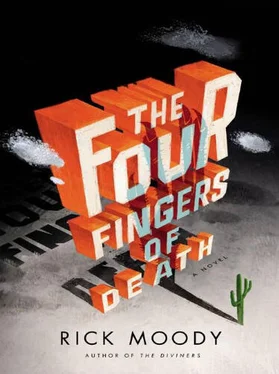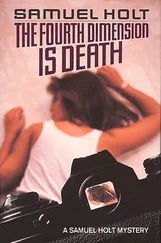Did I not know this fountaining was permitted by the program? Somehow I had never considered the ephemeral perfection of lactating before. Each of the gryphon’s three nipples spumed steadily, and I stood, in my modified lumberjack outfit, as the gryphon milked herself into my mouth. I was so high that I stopped to ponder, in the interval while I waited for the animation to reset again from 40 million miles away (we had moved out of alignment with you all), whether the gryphon milk could actually help me with my malnourishment problem. The milk was a torrent now, across my face, and I drank deeply of it, and I performed the keystrokes that would make my space arm stand up like a beacon of interplanetary comity, and then the gryphon, making some kind of horrendous mewling sound made more forbidding because of signal feedback, parted the lips of her labia and swallowed first my head and then the entirety of me. I disappeared inside.
Somewhere in the midst of this rebirthing ritual, I must have nodded off. The gryphon no doubt had her way with me, enfolding me and emulsifying me in her amorous sluices and jellies, and whether I had obliged to return the favor with my oversized animated space arm was unknown to me. I woke and it was morning, and there was an incoming message on the walkie-talkie from Steve Watanabe. I could hear the static of the radio signal. These days the walkie-talkie buzzed at me with greater and greater infrequency, as the Martians disappeared into their solitary desperations.
I shook off the morphine static from the night before and picked up the handset. Steve greeted me with his usual reserve.
“You might want to come over.”
“What’s up?”
“It’s about Abu. He wasn’t here when I woke. It was his shift, but he wasn’t here. I figured I’d go out back for a look.”
That, he told me, was when he saw Abu outside. Half stripped of his Mars outer gear, rated for the two hundred degrees below. He walked me through the details again. The sculptures, the cold, the exposure. I told him I’d be over as soon as I could.
“Is Jim anywhere around?”
“Not back yet.”
“I’m just thinking we might want to consider the possibility, you know, of foul play.”
At this point, I cut the conversation short. I told Steve I was skeptical, and I rang off. After which I tried to contact Jim Rose, who, when gallivanting around the planet on his daily or nearly daily reconnaissance missions, was often lazy about telecommunications equipment. And then with a leftover sense of responsibility, I checked the radar map on the command console to see what Brandon was up to. He had moved farther into the canyon, as if what he was looking for was buried away in the layers of dust and sediment. As if he were burrowing into the origins of the canyon, in the east. I went and suited up.
When I arrived at the Geronimo and found Steve Watanabe out front in a space suit that was nothing like the pocked rags the rest of us were wearing, a space suit mostly unused, he looked not quite as depressed as his reputation. Agitated would have better described it. Confused affect, marked by the presentation of deceit , as they are now saying in the NASA internal literature, or exhibiting symptoms of interplanetary disinhibitory syndrome . I would have also said “anxious” or “conspiratorial.” Steve was sweating, I believe. His visor was fogged up.
“He’s strapped into his bed downstairs,” he said.
Meaning Abu Jmil, first officer, sculptor, engineer of nuclear power. What was left of him. We went around to the cargo entrance and closed the squeaky hatch door behind us. There was a pall to the Geronimo . I could never understand how people could feel productive in low light. Abu, as advertised, was stretched out on one of the pallets in the cargo hold. Covered with a blanket.
“How did you get him home?”
“He was still able to walk at that point,” Steve said. “He was partially conscious. His legs did a little bit of work. Then he blacked out completely — once we got back here.”
It hadn’t occurred to me to arm myself that morning. In truth, it never occurred to me to arm myself, despite my military training. I left that to tougher people, like Abu. Pulling off my gloves and my helmet, and setting them down on the floor, I got out the radiophone I kept on my person and radioed over to the Pequod . Bad reception. All the while Steve gaped at me, as though he just didn’t know what to do with himself.
“Arnie? Laurie? It’s Jed calling.”
Arnold Gilmore’s sleepy voice on the squawk box, compressed, tinny.
“Kind of early, isn’t it?”
“Got a situation,” I said.
“What kind of a situation?”
“Steve tell you about Abu?”
He sounded confused. “What about him?”
“Says he found him out back of the power station, with his sculptures, and that Abu spent the night out there. In the permafrost. And, well, he says that Abu took off most of his outerwear. Parts of his skin were even exposed.”
“Repeat, please?” Laurie, who must have been there in the room with him, could be heard in the background. To her, Arnie mumbled, “Hang on, there’s something wrong with Abu.”
I took up the story: “Steve says that Abu was out all night working on his sculpture and that he was exposed to the low temps overnight, and Steve further observes that Abu must have elected to remove his gear.”
“Doubtful,” said Arnie, improvising. “Unless he was set on a painful death.”
“Could you make a house call?”
“As soon as I can get there.”
I holstered the communications device. Once the call to Arnie was effected, I found myself standing in a half-lit cargo bay with a very jittery young man who clearly had something on his mind. Steve shifted himself from leg to leg so violently that even in his lightweight extraterrestrial Mars surface exploration jumpsuit he was some kind of kundalini adept. And perhaps I haven’t adequately described Steve Watanabe, the George Harrison of the Mars mission, and so let me present to you, those of you who haven’t seen the portrait photo that NASA took of him in his space suit (one gloved palm on the top of his helmet as it sat imposingly on a table), nor read the press releases, nor seen the feed: the actual Steve, which is to say the Martian Steve, was generally mute, some people would say downright chilly. Not given to a smile, nor to pleasantries that lasted longer than the minimum. During the training portion of our mission, we sometimes referred to Steve as the Department of Quantitative Analysis , because of his capacity to miss the human dimension, and also because he always thought through a problem from a number of practical angles before proceeding, immobilizing himself in the process.
As I’ve mentioned, Steve has a son who had come down with an antibiotic-resistant infection just before we lifted off, and he spent quite a bit of the early portion of the trip very preoccupied with the health of this youngster. There must have been an afternoon before liftoff when Steve and his wife, Danielle, perhaps with the blessing of this eleven-year-old boy, thought through whether it would be a good thing for Steve to make his fateful journey, in a fateful black limo, to Cape Canaveral, before the final intake for liftoff. There must have been an afternoon when he and his wife tearfully arrived at a decision, with Steve, Department of Quantitative Analysis , drawing up some list of debits and credits. Worldwide fame, check. A lifetime of guilt, debit. Fantastic, unfathomable voyage, check. Shell-shocked, inconsolable wife, debit. The son, who Steve no doubt believed would improve, had been in and out of the hospital in the months since that day. Steve had been remarkably stoic, as far as I could tell, but it did seem that it wasn’t until he touched down on Mars that the enormity of the mission, the cost of it to him personally, hit home.
Читать дальше












